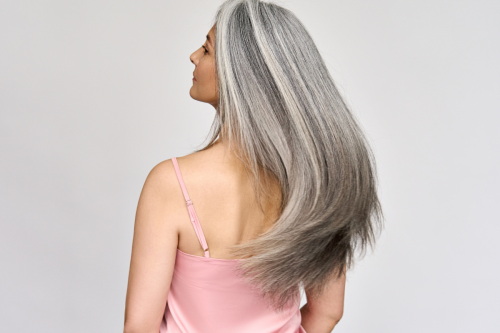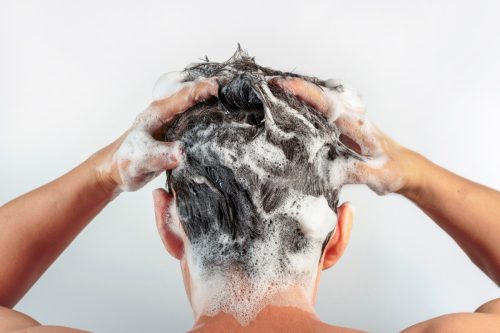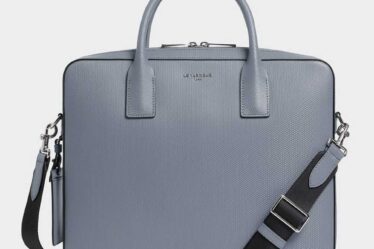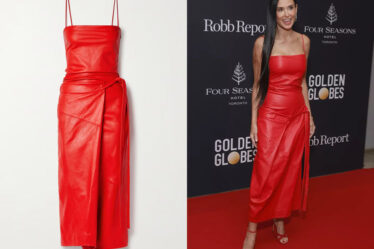
Going gray is a major change, both aesthetically and with regard to your haircare routine. And while you may think you’ve gotten your new regimen down pat, it’s important to note that gray hair has different needs in each season. During the warm weather, factors like UV rays, chlorine, humidity, and saltwater take their toll on our strands. Fortunately, this doesn’t have to be a challenging process. Keep reading to learn about caring for gray hair in the summer. Your hair will stay hydrated, healthy, and happy all season thanks to these expert tips from hair stylists.
READ THIS NEXT: If You’re Letting Your Hair Go Gray, Do This First, Experts Say.
You wouldn’t dare leave the house without your trusty SPF, but did you know hair suffers from UV damage, too? And silver strands are particularly vulnerable. “The melanin in our hair protects it from the sun, like a natural sunblock, but gray hair has little to no melanin,” says Brandie Devillier, platform educator at the Aveda Arts & Sciences Institute and certified color educator at Elevate Hair.
Gray hair that’s overexposed to the sun can appear dingy or yellow; it can also become dry, brittle, and thin. “This damage can be permanent and may have to be cut out,” Devillier warns. Thankfully, there’s an easy fix. Use a hair mist with UV protection before leaving the house, and try to wear hats or scarves to cover your hair when possible.

A day at the beach does a number on your strands. “Salt water can dry your hair and zap all moisture from your hair follicles and scalp, leaving it brittle and vulnerable,” says Cody Renegar, an L.A.-based celebrity hairstylist. “Without moisture, your hair will split and/or break.”
To combat this, Devillier suggests using a leave-in conditioner before entering the water and a clarifying shampoo after getting out.
READ THIS NEXT: If You’re Over 65, This Hairstyle Is Aging You, Experts Say.

Chlorine is a chemical oxidizer, which means it depletes the hair of the proteins that keep follicles plump and healthy, explains L.A.-based hair colorist Taylor Paschal. It also irritates the outer layer of the hair, allowing minerals to get in that can discolor your strands. What’s more, the chemical can create brittleness and frizziness.
“This can be prevented by shampooing and conditioning the hair immediately after swimming, wearing a swim cap when you swim, or applying conditioner on your hair before you swim to protect the hair follicle from absorbing chlorine,” explains Paschal. Use a combination of all three for extra protection.

Even fully-pigmented hair can act up in high humidity and hot temperatures. However, gray hair is even more susceptible to frizziness, as it tends to be drier and more brittle. The key here is hydration. “Many sorts of natural oils can be applied to your gray hair after a deep conditioning shampoo and conditioner,” says Renegar. “You want to load your gray hair, which is essentially a spongy string of tiny air bubbles. If you fill the hair shaft with all the healthy moisture, then the humidity in the air cannot penetrate and cause frizz.”
Try a hair oil, serum, or leave-in conditioner. Or, style your hair in an updo with a humidity-resistant hairspray.
For more beauty advice delivered straight to your inbox, sign up for our daily newsletter.

In the summer, it can be tempting to shower multiple times a day, especially as temperatures soar. However, you shouldn’t wash your hair every time you rinse, as overwashing can damage it. “The chemicals and heat in shampoo and conditioner strip the hair of its natural oils, leaving it dry, brittle, and prone to breakage,” says Lauren Udoh, hair stylist and hair creative director of WigReports.com. “To avoid this, people should try to only wash their hair every other day at most, using a gentle shampoo and conditioner that is sulfate- and silicone-free.”



